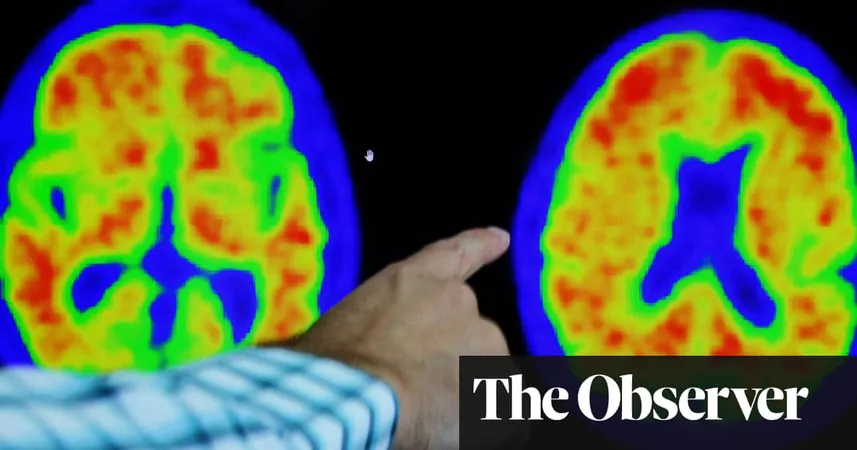
Cancer Survivors and Alzheimer’s: A Surprising Relationship Unveiled!
2024-11-16
Author: Wei Ling
Introduction
With advancing age, many people face a greater risk of developing serious health conditions, among them cancer and Alzheimer’s disease. These two illnesses are particularly concerning for aging populations in countries like the UK. Interestingly, decades ago, researchers at a psychiatric center in New York identified a puzzling correlation between cancer and Alzheimer's disease, noting an inverse relationship when examining autopsy results.
Early Investigation
One of the earliest investigations into this phenomenon was conducted by Jane Driver at Brigham and Women’s Hospital in Boston. Her pioneering study, published in 2012, tracked 1,278 participants aged 65 and older over a mean period of 10 years. The findings were startling: cancer survivors experienced a 33% decreased risk of developing Alzheimer’s compared to those without a history of cancer. However, this groundbreaking conclusion was met with skepticism. Critics pointed out potential survival bias, positing that individuals with cancer may not live long enough to develop Alzheimer’s.
Recent Studies
Since then, researchers worldwide have delved deeper into the intricate relationship between these two health challenges. A significant study released by scholars at Imperial College London in July 2023 analyzed NHS health data from over three million individuals aged 60 and older, tracking them for an average of 9.3 years while carefully correcting for biases. The results reaffirmed the earlier findings: cancer survivors had a 25% lower risk of developing dementia, particularly for common cancers such as prostate, colon, lung, and breast cancer.
Expert Insights
Erin Abner, a professor at the University of Kentucky, highlights the enduring intrigue surrounding this relationship. “Despite numerous attempts to find alternative explanations, the inverse association keeps resurfacing, and it holds true even when controlling for other variables,” she noted.
Autopsy Findings
Further investigations by Abner revealed another layer to this relationship. In a study that analyzed brain autopsies of patients from the Alzheimer’s Disease Research Center, she found that those with a history of cancer exhibited lower levels of amyloid plaques—a hallmark of Alzheimer’s disease. Her findings suggested a unique association with Alzheimer’s, distinct from other forms of dementia.
Bidirectional Relationships
But the curious connections don’t end there. Research indicates that not only do cancer survivors have a decreased risk of dementia, but individuals diagnosed with Alzheimer’s also appear less likely to develop cancer. Driver's 2012 study highlighted that patients with Alzheimer’s showed a striking 37% reduction in the likelihood of overall cancer development. This finding has been corroborated by studies in Italy and South Korea, but some skeptics argue that dementia patients may be less likely to undergo cancer screening given the potential benefits of treatments.
Further Research Directions
Elio Riboli, leading the research at Imperial College, insists that overwhelming evidence now supports the idea of a genuine inverse relationship. “Given the bidirectional nature of these findings, our next goal is to uncover the underlying biology that may connect these diseases,” he remarked.
Potential Biological Mechanisms
One hypothesis is that cancer treatment—specifically chemotherapy—may influence dementia risk. With inflammation recognized as a pivotal factor in Alzheimer’s progression, the anti-inflammatory effects of certain cancer therapies could potentially offer protective benefits to neurons.
Genetic Profiles and Risk Factors
Riboli adds that bidirectionality suggests more complex biological mechanisms are at play. His team identified a genetic profile linked to increased cancer risk, which also correlated with a reduced risk of dementia, hinting at a possible connection to tissue regeneration. Riboli explained how growth factors, related to cellular growth and renewal, might act favorably for cardiovascular health while concurrently elevating cancer risk.
Additional Anomalies
Researchers are also inspired to explore the implications of these findings. For instance, while diabetes is usually associated with an elevated cancer risk, men with diabetes impressively show a 10-20% reduced risk of prostate cancer. This anomaly invites further investigation into unique risk factors surrounding cancer development.
Contradicting Mechanisms
As cancer involves uncontrolled cell growth and dementia relates to excessive neuronal loss, Mikyoung Park from the Korea Institute of Science and Technology has reviewed contradicting molecular mechanisms that affect both conditions, possibly offering new avenues for research into Alzheimer’s disease prevention.
Conclusion and Future Research
While these unexpected associations could ultimately guide future treatments for both cancer and dementia, many questions remain unanswered, especially regarding the specific types of diseases involved. “Both cancer and dementia comprise a wide variety of conditions,” Abner acknowledged. Researchers also face hurdles due to the long latency periods between when pathologies develop and when symptoms manifest.
For now, these findings may serve as a silver lining for cancer survivors, offering hope that, while they still face challenges, they may possess a lower risk for developing Alzheimer's disease down the road. However, as research progresses, unraveling the mysteries of their intertwined relationships will be crucial in understanding these complex diseases.




 Brasil (PT)
Brasil (PT)
 Canada (EN)
Canada (EN)
 Chile (ES)
Chile (ES)
 España (ES)
España (ES)
 France (FR)
France (FR)
 Hong Kong (EN)
Hong Kong (EN)
 Italia (IT)
Italia (IT)
 日本 (JA)
日本 (JA)
 Magyarország (HU)
Magyarország (HU)
 Norge (NO)
Norge (NO)
 Polska (PL)
Polska (PL)
 Schweiz (DE)
Schweiz (DE)
 Singapore (EN)
Singapore (EN)
 Sverige (SV)
Sverige (SV)
 Suomi (FI)
Suomi (FI)
 Türkiye (TR)
Türkiye (TR)